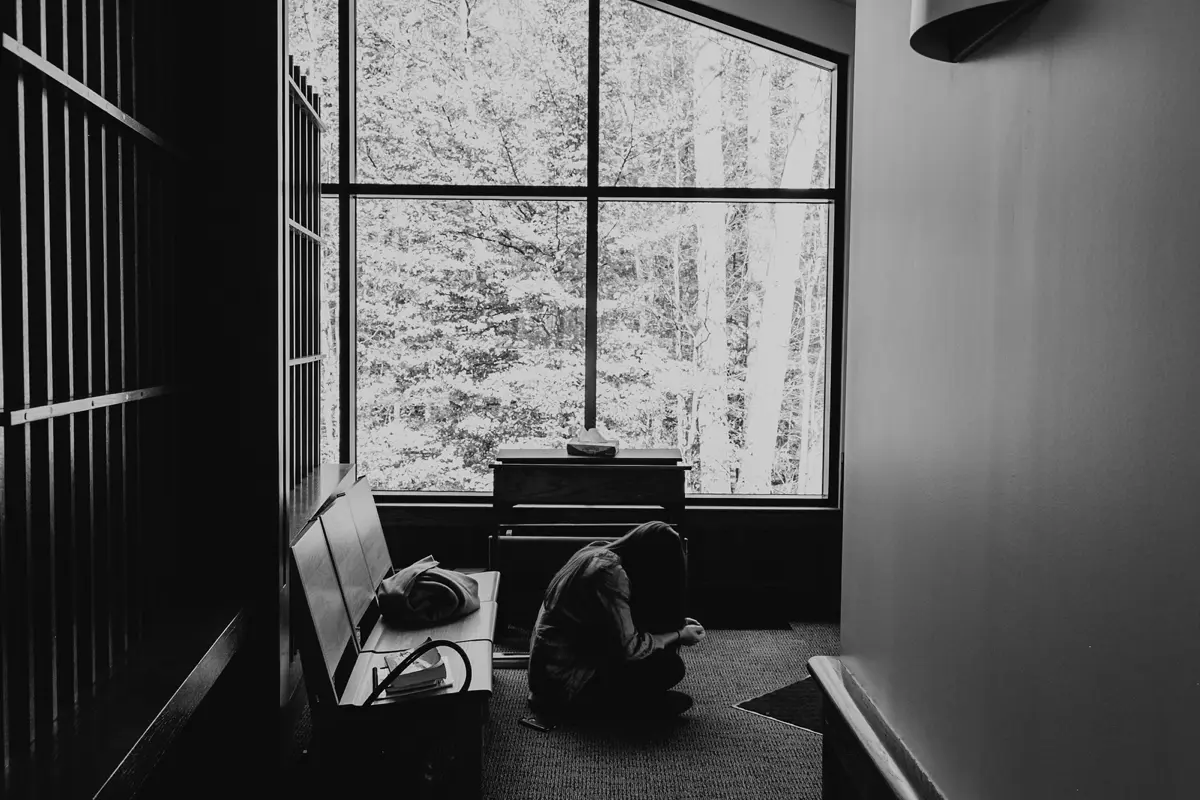Bridges terrify me. Why? I do not fully know. The fear may stem from the knowledge that below me lies a rushing river and the only separation between me and certain death is a perilous construction of metal and concrete. Maybe it stems from the fear of falling into the vast unknown. Whatever the reason, whenever I cross a bridge, my heart beats faster and I cannot look down, only forward.
Despite my fear, whenever I cross a bridge, the lectures on symbolism from my AP English course return to my mind, forcing me to recognize the analogies between crossing the physical bridge and the daily bridges of my life.
These thoughts of symbolism once again flooded my mind as I crossed the bridge heading back to Benedictine College for the spring semester. Anxiety swelled within me as I thought about the semester to come. Fears about new classes, navigating different relationships and facing spiritual struggles all bubbled to the surface. I came face to face with the real fears of the next semester of college: a semester that would require me to bridge the gap between childhood and adulthood.
College serves as a bridge. It carries one from the dependency of childhood to the freedom of adulthood. One looks down from the bridge of college and sees a rushing river of fear and anxiety swelling into fierce rapids below.

Standing on this collegiate bridge of sorts, I often find myself paralyzed by fears of the future, the tasks at hand, and the decisions that lie before me. Despite the fear and despair that rages throughout the college years, there is a solution: to call upon the One who created us.
In Chapter 4 of the Gospel of Mark, Christ travels out into the Sea of Galilee with His apostles when “A furious squall came up, and the waves broke over the boat, so that it was nearly swamped. Jesus was in the stern, sleeping on a cushion. The disciples woke him and said to him, “Teacher, don’t you care if we drown?” He got up, rebuked the wind, and said to the waves, “Quiet! Be still!” Then the wind died down and it was completely calm” (37-39).
“Why are you terrified? Do you not yet have faith?”
Mark 4:40
This passage provides the solution for when we face the storms of anxiety and fear: to call upon the Lord. To face the storm, the disciples had to act. They had to awaken Christ and implore Him for His saving grace.
Society frowns upon asking for help, especially help from the Lord. When faced with a challenge, we are either told to suck it up, or we are forced to look towards alcohol, drugs, or sex to drown out our issues. Yet, by turning to these worldly solutions in college, we are simply jumping blindly off the bridge, allowing the rapids of life to sweep us into a greater abyss.
When we ask the Lord for help, however, we invite him onto the bridge with us. And when invited onto the bridge, Christ doesn’t simply provide advice; He calms the storms beneath us. Furthermore, He leads us to the other side. But it requires us to invite Him. When He walks out onto the bridge with us, that journey across becomes a lot less daunting; the river below calms; the bridge becomes less terrifying; and we can move forward.

Yet even while steadfastly moving forward, crossing the bridge proves difficult. One cannot do it through human strength alone. Moving forward requires virtue. Although many virtues are needed, there is one that is particularly necessary, and it is one that I struggle greatly with myself: humility. As someone often consumed by pride and my own ego, growing in the virtue of humility is a constant battle. Yet over this first year of college, an appreciation for the virtue of humility has emerged. As humility forces one to rely on others and on God, it requires one to trust and surrender themselves.
More than just forgoing one’s pride, humility can be defined as the virtue through which one recognizes that God is the creator of all things. Through this, one can better come to terms with who they are and what they are capable of.
To grow in humility, one must hone in on on two aspects: humility with others and humility with God. Humility with others is difficult, especially for me. As I mentioned, I am a very prideful person with great ambition and boldness. Now ambition and boldness are not intrinsically bad traits—in fact, I believe that when properly harnessed, they can be great tools for advancing the Kingdom. But when my ambition, boldness, and pride merge, a Molotov cocktail of vanity forms. Countless times have I bragged about my accomplishments, my strengths and just how great I believe I am, to impress my friends, a girl, or adults so I can gain some personal advantage. It is selfish; I am aware.
To grow in humility, one must hone in on on two aspects: humility with others and humility with God.
So how do you build the virtue of humility when you interact with others? It requires listening. Our society devalues the art of listening. Whether it be through the temptation of succumbing to the endless social media scroll, or the idea that you always must be the center of attention with your peers, few people understand the art of listening. It is only through listening that we will understand a person’s story; learn how the Lord has impacted their life; and how we can serve them. By understanding where a person has come from, we will come to recognize that we are only a small cog in the machine that is our world. That is humility.
There is someone else we need to listen to daily: God. To listen to God we must pray, and prayer requires humility. When discussing prayer, the Catechism states: “He who humbles himself will be exalted; humility is the foundation of prayer, only when we humbly acknowledge that ‘we do not know how to pray as we ought,’ are we ready to receive freely the gift of prayer. ‘Man is a beggar before God’” (CCC 2559).

Humility is key to authentic prayer because it allows us to freely receive that which God desires us to receive. For me, approaching God with authentic humility in prayer becomes difficult because it forces me to recognize that I need help. Humility in prayer, for me, takes the form of simply telling the Lord exactly how I see my life. Not the way I share my life with my friends or parents, but how I see it. With God I share all the messy drama, all the wounds, and all the joys—because what do I have to lose? And then, just like I do with my friends, I stop talking and listen to what He has planned for me.
To cross life’s bridges, one needs to accept that they cannot do so alone—that they need the help of God and those around them. Often though, our pride traps us on the bridge, and we find ourselves unable to move forward. Through embracing the virtue of humility, we will not only find the ability to ask for help, but also the ability to detach ourselves from the pride which binds us on the bridge. And with God at our side, we will be able to cross, one step at a time.
